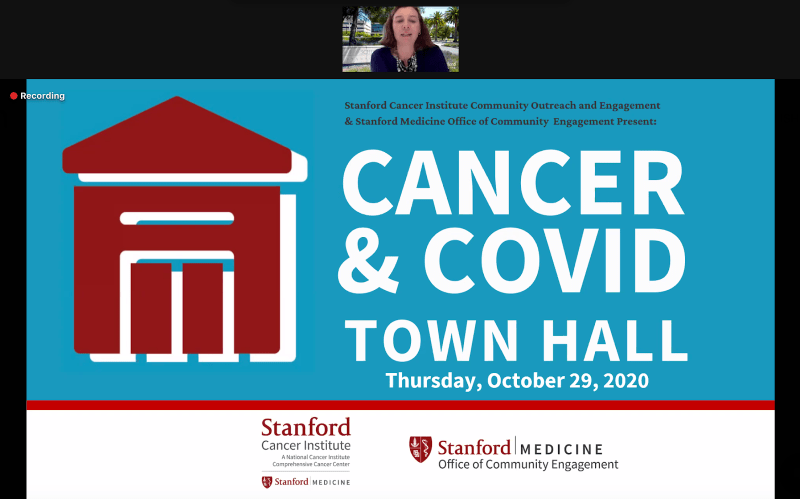Stanford faculty and community partners raised concerns over delays in cancer screening and treatment, as well as the financial impacts of the pandemic, during Stanford’s Cancer and COVID-19 Community Town Hall on Thursday.
“When COVID started, a lot of the clinics weren’t open and seeing patients as quickly as [they] needed to be seen,” said Melissa Bondy, chair of the Department of Epidemiology and Population Health. People reduced their cancer screening practices and were less likely to return to clinics to follow up on any suspicious findings or symptoms, according to Bondy.
In addition to delayed diagnoses, patients who are currently receiving cancer treatment have faced challenges with deferred care, according to the panelists. The postponement of surgery, radiation and chemotherapy treatments was driven by the “fear of catching COVID or the fear of having vulnerable patients,” said Lidia Schapira, a Stanford medical oncologist.
“Your zip code matters,” Schapira added. Some areas of the country had “a total interruption of cancer services,” while others, including the Bay Area, have returned to “something that felt a bit more normal,” she said.
Delayed screening and care will “affect mostly uninsured, under-insured or underserved populations,” according to Bondy.
This delay is compounded by the financial impacts of COVID-19. Steve O’Brien, Chief Medical Officer at the Alameda Alliance for Health, explained that many commercial line patients struggled with their co-pays due to unemployment, affecting many cancer patients’ ability to afford treatment.
Providers have also “had a decrease in their volume, a decrease particularly in their commercial volume which sustains hospitals that see a lot of Medi-Cal and Medi-Care patients,” O’Brien said. “Clinics are suffering significant increased expenditures, and solo providers are suffering.”
Beyond these tangible impacts, Schapira added that “our ways of relating to each other changed.”
Families are no longer able to accompany patients to treatment areas, and routine visits are no longer in-person — a change that may increase anxiety and worry for patients and their families.
Sharing stories of his experiences treating cancer patients during the pandemic, Stanford medical oncologist Elwyn Cabebe recalled that one of his patients was “isolated for seven days waiting for COVID tests,” unable to see any family members despite being given a “life-threatening cancer diagnosis.”
These adverse effects of COVID-19 on cancer could extend well beyond 2020. Citing a National Cancer Institute study on the cumulative excess deaths from colorectal and breast cancers, Bondy pointed out the increased mortality that could be seen through 2030 if diagnoses and treatments continue to be deferred.
Cancer research during the pandemic
Since the beginning of the pandemic, most of the cancer research community has pivoted their work to focus on gaining a greater understanding of how COVID-19 has affected cancer patients.
At Stanford, Cabebe and Schapira are co-investigators for the Cancer and COVID-19 Consortium (CCC19), an association comprising over 120 institutions across the U.S. and Canada. Through data collection and analysis from patients, their goal is to find trends in the impacts of COVID-19 on cancer treatment and survival.
“Cancer patients are really the poster child for those who are immunocompromised,” Cabebe said.
The American Society of Clinical Oncology (ASCO) has conducted studies on racial and ethnic disparities in relation to COVID-19 and cancer, finding that Hispanic and Black cancer patients had, respectively, 5- and 1.7-times higher likelihood to develop COVID-19 compared to their white counterparts.
“I think that’s really unmasking the social inequities and health disparities that we are struggling with in this country today,” Cabebe said.
The Community Advisory Board and Stanford Cancer Institute, led by Whitney Greene-Nymo, a co-host of the town hall, are “looking at innovative ways to really address the needs of these marginalized communities and groups,” Cabebe said.
Amid the creation of these new COVID-19 initiatives, traditional cancer research has slowed down, and that may “delay progress in terms of finding better treatments for cancer,” Schapira said. However, it has shown the “incredible speed” with which cancer researchers and clinicians can come together and collaborate and has accelerated processes for sharing data between institutions, according to Schapira.
Greene-Nymo wrote that increasing the accessibility of quality information was a goal of the event, along with “providing local and regional community with credible information on how COVID has impacted cancer prevention and screening, how it has impacted cancer patients and survivors . . . and how it has impacted cancer patient finances,” in a statement to The Daily.
“There is no denying that we are living through a crisis and that many people have questions about how the pandemic has or will affect their care for cancer,” Schapira wrote in a statement to The Daily. “Being able to listen to experts and ask questions is essential to feel informed and connected.”
“There is also a tremendous amount of misinformation during this time so we want to provide credible, trusted sources of information for the community,” Greene-Nymo wrote.
The town hall was offered in English and translated into Spanish by two live interpreters, and attendees were encouraged to type out questions in Spanish.
“I would just encourage everyone to take care of each other,” Cabebe said.
“It is a time of very significant change and a time of profound impact, and it is a time for reconsideration,” O’Brien added. “This is not our new life, this is a chapter . . . Keep in mind [that] we’re going to get through this.”
Contact Athena Xue at axue8 ‘at’ stanford.edu.
